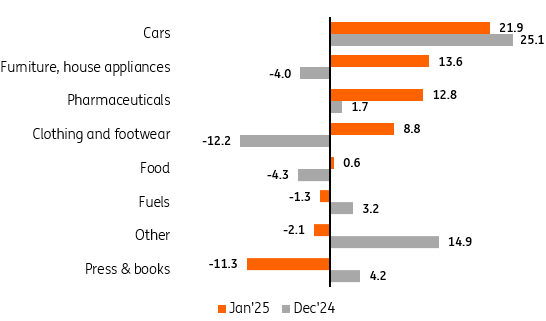January retail sales exceeded expectations, indicating that Polish consumers are more willing to spend on durable goods compared to 2024 when households were frugal despite a strong increase in real disposable income. Savings accumulated in 2024 should support consumption growth this year despite slowing wage growth and lower indexation of pensions.
Retail sales of goods increased by 4.8% year-on-year (YoY) in January, surpassing ING's forecast of 2.0% and the consensus estimate of 1.5%. This follows a 1.5% YoY rise in December 2024. Seasonally adjusted data indicates a 0.6% month-on-month (MoM) growth in sales.
After a surprising downturn in September, likely due to floods, consumption began to recover. January showed particularly encouraging signs with a rebound in durable goods sales, which had been declining throughout 2024. Sales of furniture, electronics, and household appliances surged by 13.6% YoY in January, following a 4.0% YoY decline in December. Clothing and footwear sales also saw an 8.8% YoY increase, compared to a 12.2% YoY drop in December. Pharmaceuticals sales experienced high growth, rising by 12.8% YoY, up from 1.7% YoY the previous month. Car sales remained buoyant, growing by 21.9% YoY. However, food sales remained subdued with a 0.6% YoY increase, likely due to rising prices.
Sales of durable goods improved in January
Retail sales of goods (real), %YoY
(Click on image to enlarge)

Source: GUS.
The start of 2025 has shown promising signs in retail and a resurgence in household purchasing activity. January's data suggests a positive outlook for private consumption in the first quarter of 2025. However, we remain cautious in our forecasts for 2025 due to slower growth in real disposable income, driven by slower wage growth, lower pension indexation, and higher inflation.
Maintaining the consumption growth rate observed in 2024 will likely require households to tap into their savings from last year. We estimate that consumption growth could accelerate to 3.5% year-on-year (YoY) in the first quarter of 2025, up from 3.2% YoY in the fourth quarter of 2024, with GDP growth expected to be 3.0% YoY compared to 3.2% YoY, respectively.
More By This Author:
FX Daily: Euro Welcomes German Election Result Asia Week Ahead: Japan Inflation Intrigue And Bank Of Korea Rate Decision Eurozone PMI Shows Little Relief From Stagnation Just Yet
Disclaimer: This publication has been prepared by the Economic and Financial Analysis Division of ING Bank N.V. (“ING”) solely for information purposes without regard to any ...
more
Disclaimer: This publication has been prepared by the Economic and Financial Analysis Division of ING Bank N.V. (“ING”) solely for information purposes without regard to any particular user's investment objectives, financial situation, or means. ING forms part of ING Group (being for this purpose ING Group NV and its subsidiary and affiliated companies). The information in the publication is not an investment recommendation and it is not investment, legal or tax advice or an offer or solicitation to purchase or sell any financial instrument. Reasonable care has been taken to ensure that this publication is not untrue or misleading when published, but ING does not represent that it is accurate or complete. ING does not accept any liability for any direct, indirect or consequential loss arising from any use of this publication. Unless otherwise stated, any views, forecasts, or estimates are solely those of the author(s), as of the date of the publication and are subject to change without notice.
The distribution of this publication may be restricted by law or regulation in different jurisdictions and persons into whose possession this publication comes should inform themselves about, and observe, such restrictions.
Copyright and database rights protection exists in this report and it may not be reproduced, distributed or published by any person for any purpose without the prior express consent of ING. All rights are reserved. ING Bank N.V. is authorised by the Dutch Central Bank and supervised by the European Central Bank (ECB), the Dutch Central Bank (DNB) and the Dutch Authority for the Financial Markets (AFM). ING Bank N.V. is incorporated in the Netherlands (Trade Register no. 33031431 Amsterdam). In the United Kingdom this information is approved and/or communicated by ING Bank N.V., London Branch. ING Bank N.V., London Branch is deemed authorised by the Prudential Regulation Authority and is subject to regulation by the Financial Conduct Authority and limited regulation by the Prudential Regulation Authority. The nature and extent of consumer protections may differ from those for firms based in the UK. Details of the Temporary Permissions Regime, which allows EEA-based firms to operate in the UK for a limited period while seeking full authorisation, are available on the Financial Conduct Authority’s website.. ING Bank N.V., London branch is registered in England (Registration number BR000341) at 8-10 Moorgate, London EC2 6DA. For US Investors: Any person wishing to discuss this report or effect transactions in any security discussed herein should contact ING Financial Markets LLC, which is a member of the NYSE, FINRA and SIPC and part of ING, and which has accepted responsibility for the distribution of this report in the United States under applicable requirements.
less
How did you like this article? Let us know so we can better customize your reading experience.




